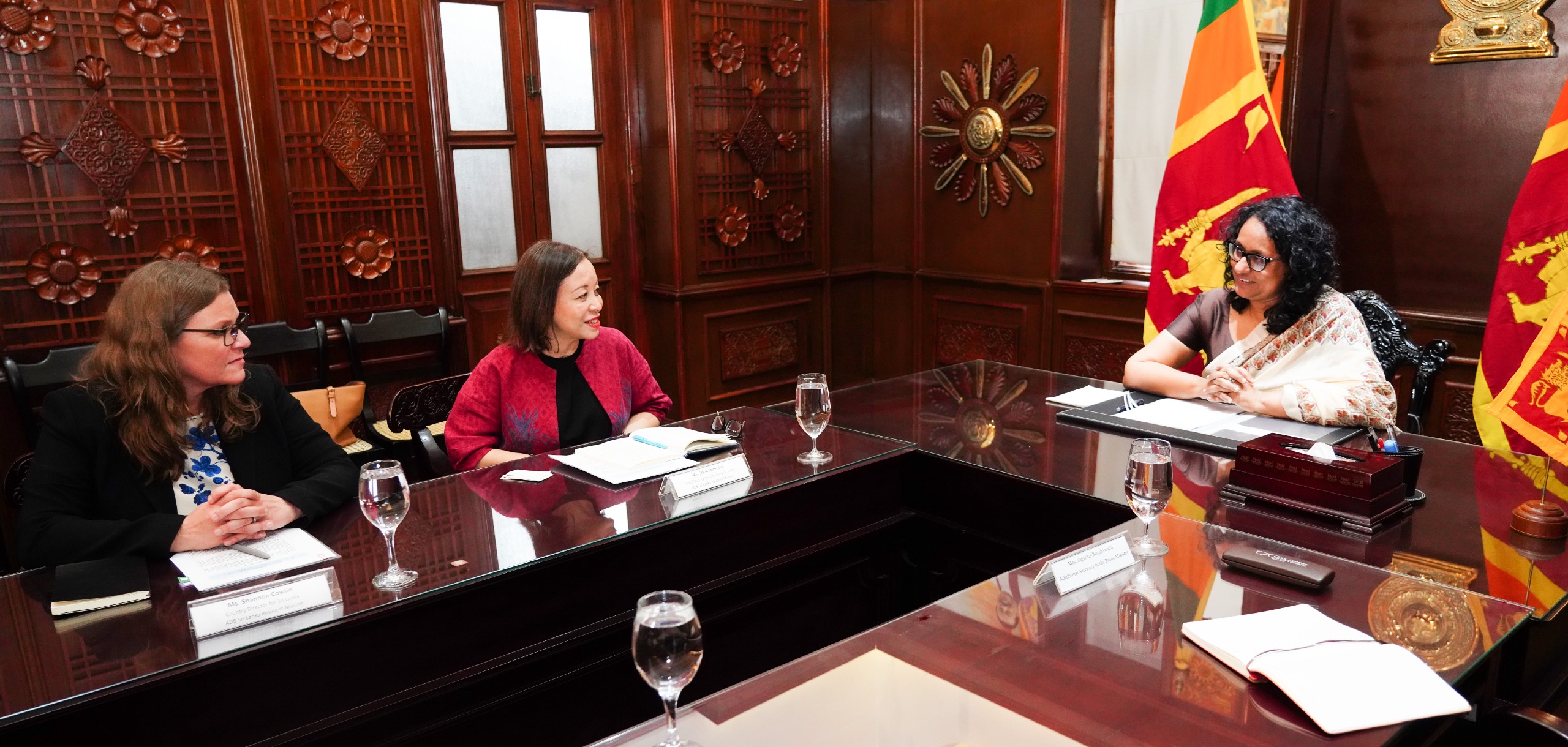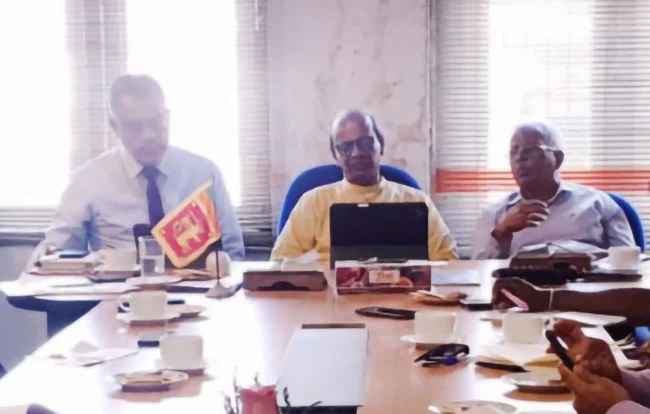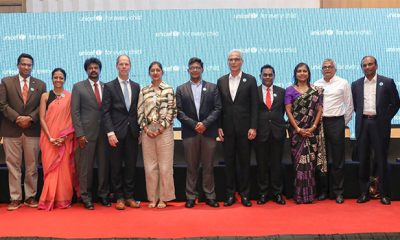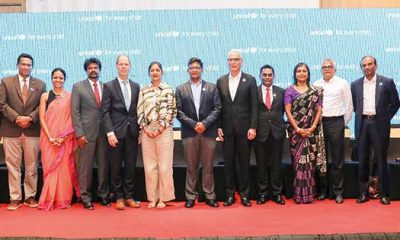Business
Developing plans and policies without young people is a futile exercise: UNICEF Sri Lanka

Series of crises SL has faced have dealt a heavy blow
Reviving presents SL with an opportunity to address its long-running challenges
by Sanath Nanayakkare
Young people are not only the present but also the future; developing plans and policies without them is a futile exercise, they need to be the front and centre of the discussions because they are the ones with fresh ideas and the most at stake, in terms of the sustainability of the planet and the tourism sector, Christian Skoog, Representative, UNICEF Sri Lanka said in Colombo yesterday.
“Here in Sri Lanka, we have a gift. That gift is the 4.4m young people. The contribution young people can make to the tourism sector is immense. But to harness their energy and ideas, there is a need to provide them the skills, training and opportunities to thrive within a dynamic and fast-growing industry,” he said.
“Across the world it is young people who are the hungriest for travel. They are seeking new experiences and looking to broaden their horizons. They serve not only as your potential clientele, they are also your best marketers through tools like social media. Indeed, Sri Lanka has been named one of the world’s most instagramable locations,”
“Rarely has there been such an urgent moment for us to ensure the energy and enthusiasm of young people to contribute to Sri Lanka’s sustainable development is given expression. And rarely has there been such an opportune moment to discuss building back better in the context of sustainable tourism.
Skoog made these points at an event hosted by the Chamber of Tourism and Industry held to mark the World Tourism Day.
Further speaking he said:
“Today we consider how to sustainably revive a sector upon which the livelihoods of so many people depend and we discuss how we can effectively respond to the challenges that confront us. When I learned in late 2020 that I would be appointed to serve as UNICEF Rep in Sri Lanka, I felt invigorated by the prospect of coming. Of course, much of that vigour was related to the work I expected to undertake here. But I confess that part of my excitement came from listening to my friends saying it is “paradise” and “best vacation spot”. Whenever I have had the opportunity to explore Sri Lanka since, I have been captivated by the landscapes, the biodiversity, the food, and the warmth of the people I meet across this island. But of course, I also arrived at a time of profound economic hardship for so many. I know those impacts have been felt deeply across the tourism sector. Many of you have struggled valiantly to keep your businesses running, and to maintain decent livelihoods for workers across the sector: from hoteliers to taxi drivers to souvenir sellers, to tour guides, to wait staff.”
“Sri Lanka’s tourism sector has contended with a succession of adverse events in the past 3 years: 1) The devastating terrorist attacks of Easter 2019 reduced arrivals by 18%. 2) COVID-19 crisis shut borders & paralysed air travel. 3) Conflict in Ukraine entirely cut a tourism market that until recently represented 25% of foreign arrivals. And, of course, economic crisis continues to pose an array of challenges. Reviving tourism in a manner that is sustainable and inclusive is one of the key tools to help us navigate through this crisis.”
“I would like to reiterate the importance of sustainable tourism in Sri Lanka, to touch upon the relationship between sustainable tourism and the SDGs, and mention the role young people can play as we re-think tourism in Sri Lanka.”
“Tourism is a critical component of the economy; it is Sri Lanka’s 3rd-largest source of foreign exchange, and contributed about 5% of GDP, pre-COVID. Tourism is also a major employer of people across the island. In fact, globally, tourism employs one in every ten people.”
“Let’s be under no illusions. The series of crises SL has faced have dealt a heavy blow. But the task we now face in reviving the sector also presents us with an opportunity to address some its long-running challenges.”
“These include over-tourism and other unsustainable practices; contributions to Climate Change; pollution; a loss of biodiversity; and a lack of inclusion. As an island nation with extraordinary biodiversity, Sri Lanka is particularly vulnerable to the adverse effects of unsustainable tourism.”
“Indeed, when tourism arrivals plunged during the pandemic, many destinations took the opportunity to reflect on the toll irresponsible or unsustainable practices had on their ecologies; and they resolved to do this differently. We too, should resolve to do things differently.”
“As tourism returns, the demand for ethical and sustainable products and experiences continues to rise. We can no longer consider sustainable tourism offerings as a choice. Costs incurred in adopting practices that benefit the environment and community, need to be looked at as investments which provide the industry with an advantage.”
“The tourism sector, as a whole, needs to focus on marketing Sri Lanka as not only a desirable destination because of its natural beauty, culture and heritage, but also differentiating it as a sustainable destination.”
“I believe that harnessing tourism’s positive contribution to sustainable development and the mitigation of the sector’s adverse effects calls for strong partnerships and decisive action by all tourism stakeholders.”
“Events like this give us an opportunity to build partnerships: to reflect, and to share ideas and strategies. Creating true partnerships of both public and private sector operators in the country is key to our ability to revive the sector and develop sustainable tourism as a tool for a better future for Sri Lanka.”
“With the right safeguards in place, tourism can provide decent jobs, particularly for young people, it can inspire us to protect life on land and life below water, it can help build resilient, gender-equal, inclusive economies and societies that work for everyone. And it can help Sri Lanka thrive,” the UNICEF representative said.
Business
Newly appointed ADB Country Director to Sri Lanka and delegation meet PM

The newly appointed Country Director of the Asian Development Bank for Sri Lanka Ms Shannon Cowlin and the accompanying delegation met with Prime Minister Dr. Harini Amarasuriya on Tuesday [0th of February] at the Prime Minister’s office.
Welcoming the delegation, the Prime Minister extended congratulations to the newly appointed Country Director and acknowledged the long-standing partnership with the Asian Development Bank. The Prime Minister also expressed appreciation for ADB Bank’s continued engagement and support aligned with Sri Lanka’s national development priorities.
The Prime Minister also conveyed gratitude for the timely assistance extended by the ADB in response to Cyclone Ditwah, noting the importance of such support in mitigating the immediate impacts of natural disasters.
The ADB delegation reiterated its readiness to further assist Sri Lanka during the post-cyclone recovery phase, including rebuilding and reconstruction efforts, and emphasized its commitment to the supporting the education sector.
The meeting was attended by OIC / Deputy Director General, SARD Ms. Sona Shrestha, Ms. Cholpon Mambetova Country Operations Head of ADB Sri Lanka Mission Resident, Additional Secretary to the Prime Minister Ms. Sagarika Bogahawatta, Director General of the External Resource Department, Ministry of Finance Samantha Bandara, Director for ADB Division in External Resource Department, Ministry of Finance Ranjith Gurusinghe.
[Prime Minister’s Media Division]
Business
‘Bad Bank,’ Big Stakes: Sri Lanka’s Rs. 300bn gamble on growth

Sri Lanka’s small and medium enterprise (SME) sector—responsible for 52 percent of GDP and employing nearly half the national workforce—has become the next decisive test of the country’s fragile economic recovery.
A proposal to establish a Rs. 300 billion “Bad Bank” to absorb distressed SME loans now places policymakers at a crossroads: act boldly to revive credit and growth, or risk entrenching stagnation in the real economy.
The Sri Lanka Chamber of Small and Medium Industries (SLCSMI) on Tuesday told journalists that they had unveiled a detailed blueprint aimed at restructuring an estimated Rs. 460 billion in non-performing loans (NPLs), much of it concentrated among SMEs battered by successive shocks—from the Easter Sunday attacks and the pandemic to sovereign default and climate-related disruptions such as Cyclone Ditwah.
While headline indicators suggest macroeconomic stabilisation, including lower inflation, improved reserves and a profitable banking sector, credit transmission to smaller enterprises remains severely constrained, Chambers think tank pointed out.
“This is not about rewarding defaulters,” said SLCSMI President Prof. Rohan De Silva. “It is about protecting the productive backbone of the economy. If SMEs collapse, the consequences will extend far beyond individual balance sheets.”
Despite strong liquidity and a return to profitability in the banking system, thousands of SMEs remain blacklisted at the Credit Information Bureau (CRIB), unable to access fresh working capital.
The Chamber argues that unless distressed assets are separated from viable enterprises, banks will remain structurally risk-averse, prolonging the paralysis in private sector credit growth.
The proposed “Bad Bank” would function as a specialised rehabilitation vehicle, purchasing or warehousing toxic SME loans and granting viable firms a five-to-ten-year restructuring window, shielded from parate execution, to rebuild cash flows. Senior Vice President Colvin Fernando described the initiative as an economic circuit-breaker rather than a bailout. “These are not failed enterprises,” Fernando said.
He added:”They are businesses hit by extraordinary external shocks. Unless we ring-fence these distressed loans, credit transmission will remain paralysed.”
The concept draws on international precedents where asset management companies were deployed after systemic crises. Yet such mechanisms succeed only when governed by strict asset valuation discipline, professional management and insulation from political interference. Without these safeguards, they risk becoming vehicles for concealed subsidies or fiscal leakage.
The most contentious element of the Chamber’s proposal lies in its funding model. It calls for a hybrid structure combining low-cost international financing, a levy on commercial bank profits and the utilisation of unutilised balances from the Employees’ Provident Fund (EPF) and Employees’ Trust Fund (ETF).
Prof. De Silva argues that the banking sector, having restored profitability partly through elevated interest margins during the crisis years, has both the capacity and systemic responsibility to contribute. “The banking system has returned to strong profitability,” he said. “A structured contribution toward SME rehabilitation is not punitive—it is an investment in systemic stability.”
The suggested mobilisation of pension fund balances, however, is likely to provoke scrutiny over governance and fiduciary safeguards, while a levy on bank profits may raise investor sensitivity in a sector that has only recently regained confidence.
Fernando acknowledged the risks, emphasising that transparency and strict eligibility criteria would be essential. “This must be professionally managed, transparent and focused strictly on viable enterprises. Without discipline and accountability, the entire purpose would be defeated,” he cautioned.
Adding urgency to the debate is the Government’s decision to lower the VAT registration threshold to Rs. 36 million annually from April 1, 2026, drawing more small firms into the tax net. The Chamber warns that tightening tax compliance while credit remains restricted could create a double squeeze. “You cannot increase tax burdens and restrict financing simultaneously without economic consequences,” Prof. De Silva observed, describing the timing as highly sensitive.
Immediate Past President Mohideen Cader underscored the scale of the stakes. With SMEs contributing 52 percent to GDP and already under severe strain, he warned that inaction would result in irreversible economic scarring.
The macroeconomic logic is clear: without restoring SME balance sheets, private investment and employment growth are unlikely to regain momentum. Yet the countervailing risk is equally apparent. A poorly designed vehicle could create moral hazard, transfer private losses onto public shoulders and introduce new contingent liabilities into an economy still emerging from sovereign default.
Sri Lanka’s IMF-backed reform programme has so far focused on fiscal consolidation and debt sustainability. The SME “Bad Bank” proposal introduces a more complex phase in the recovery narrative—one that shifts attention from stabilisation to growth. The question confronting policymakers is whether the economy can sustain recovery without unclogging the credit arteries that feed its most labour-intensive sector.
The Rs. 300 billion proposal is, in essence, a calculated gamble that repairing SME balance sheets will unlock lending, revive investment and restore economic momentum. If executed with rigour, transparency and independence, it could serve as a bridge from crisis management to expansion. If mishandled, it risks deepening vulnerabilities in a system that has only recently regained its footing. For an economy seeking to move beyond stabilisation, the stakes could hardly be higher.
By Ifham Nizam
Business
The all-new Nissan Almera has arrived

Associated Motorways (Private) Limited (AMW), a stalwart of Sri Lanka’s automotive industry, officially unveiled the all-new Nissan Almera on February 7th, 2026. The launch, held at the Nissan Showroom in Union Place, signaled a bold step forward in providing ‘market-relevant mobility solutions’ to a dicerning local audience.
Addressing the gathering, Jawahar Ganesh, Group Managing Director of AMW, highlighted the strategic engineering behind the new model.
“The all-new Nissan Almera has been thoughtfully engineered to deliver what today’s Sri Lankan customer truly values: efficiency, safety, comfort, and intelligent design,” Ganesh stated.
He further emphasised that AMW’s leadership, backed by the global expertise of the Al-Futtaim Group, remains committed to bringing world-class standards to the local market.
Echoing this sentiment, Atul Aggarwal, Director Aftersales and South Asia Business Unit for Nissan Motor Corporation, noted that the Almera is designed to offer the ‘Nissan Peace of Mind.’ He expressed confidence that the sedan would replicate the massive market success recently seen by the Nissan Magnite.
The Almera is powered by the unique HRA0 1.0-litre Turbo engine, producing 100 hp and 152 Nm of torque. This ‘flat torque’ setup ensures responsive acceleration for city driving and confident overtaking on highways. To bolster fuel economy, it features an Idling Stop system.
Inside, the cabin prioritises the “human element” with:
Quole Modure Seats: Innovative materials that reflect heat, keeping the cabin cool in the tropical sun.
Zero Gravity Seats: Ergonomically designed to reduce fatigue during long commutes.
360-degree Safety Shield: A comprehensive suite including an Around View Monitor, Blind Spot Warning, and Lane Departure Warning.
With immediate stock availability and flexible financing via AMW Capital Leasing, the Almera is positioned as the premier choice for professionals and families seeking a smart, refined, and safe driving experience.
Although AMW did not announce pricing at the event, sources told The Island Financial Review that the new sedan will retail in the LKR 12.5–13 million range. Early birds are in for a win, too, with an encouraging discount reserved for the first 100 buyers.
Notably, the event was a departure from typically lengthy automotive launches, the Almera ceremony was a masterclass in simplicity. The entire event concluded in just twenty minutes – comprising a 15-minute preamble and speeches, followed by a five-minute ceremonial reveal as the Almera glided into the auditorium.
Participants described the event as ‘short and sweet,’ a sentiment that aligned perfectly with the ‘C-word’ emphasised by Jawahar Ganesh, Group Managing Director of AMW about the Nissan brand: Credibility.
By Sanath Nanayakkare
-

 Features5 days ago
Features5 days agoMy experience in turning around the Merchant Bank of Sri Lanka (MBSL) – Episode 3
-

 Business6 days ago
Business6 days agoZone24x7 enters 2026 with strong momentum, reinforcing its role as an enterprise AI and automation partner
-

 Business5 days ago
Business5 days agoRemotely conducted Business Forum in Paris attracts reputed French companies
-

 Business5 days ago
Business5 days agoFour runs, a thousand dreams: How a small-town school bowled its way into the record books
-

 Business5 days ago
Business5 days agoComBank and Hayleys Mobility redefine sustainable mobility with flexible leasing solutions
-

 Business2 days ago
Business2 days agoAutodoc 360 relocates to reinforce commitment to premium auto care
-

 Business6 days ago
Business6 days agoHNB recognized among Top 10 Best Employers of 2025 at the EFC National Best Employer Awards
-

 Midweek Review2 days ago
Midweek Review2 days agoA question of national pride

















